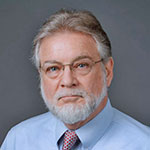
Photo & Text Report: Penn LDI at the 2025 AcademyHealth Research Meeting
A Gathering of a Health Services Research Community Currently Under Siege
News

Twenty-five years after she and Wharton School health economist Mark Pauly launched an innovative program to broaden diversity in the health services research workforce, Joanne Levy—who has led the Summer Undergraduate Mentored Research (SUMR) program since its inception—took the AcademyHealth stage to celebrate both SUMR’s quarter-century milestone and its national AcademyHealth award.
A joint program of the Leonard Davis Institute of Health Economics (LDI) and the Wharton School’s Health Care Management Department, SUMR is designed to advance health equity and channel undergraduates toward advanced degrees and careers in the health services research field. It annually recruits several dozen young scholars for a summer-long curriculum that pairs each with top faculty researchers and immerses the cohort in the daily life and work of Penn’s broad, multidisciplinary community of HSR researchers.
This year, SUMR won AcademyHealth’s 2025 Mosaic Award for its work and commitment to creating a more representative and welcoming experience for undergraduates interested in joining the scientific community that focuses on analyzing how U.S. health care is organized, financed, managed, delivered, and quality controlled.
Edited for brevity, these are the main points of Levy’s remarks from the podium as she looked back at the program’s history, as well as its living future sitting in the rows in front of her:
“We are truly honored to receive the 2025 Mosaic Award. This recognition means so much to us—not just because it celebrates inclusion, mentorship, and representation, but because it reminds us why this work matters. Twenty-five years ago, the summer program was born out of a bold vision that the future of health services research should look like the world we live in, and that we needed a pipeline that welcomed more voices, more stories, and more perspectives. Back then, the idea of weaving together equity, mentorship, and representation in the training of undergraduate researchers wasn’t standard practice. It was a challenge to the status quo.”

“SUMR didn’t just meet that challenge. It redefined what was possible.”
“It’s remarkable that what we started with just three students in the first year is now a community of more than 400 alumni. Today’s honor isn’t just about an award; it’s a celebration of 25 years of transformation. Hundreds of students—many of them the first in their families to attend college, many from backgrounds underrepresented in research—found more than a summer opportunity. They found their voices, their paths, their community. And we’re so proud to see our alumni thriving across sectors every day, earning MDs, MPHs and other degrees, conducting policy-shaping research, leading organizations, and, most importantly, mentoring the next wave of scholars with the same generosity and intentionality they once received.”
“What truly sets SUMR apart and made it so special is the community of incredible faculty mentors that power it. Thank you to all of them. Every year, you open your doors, your projects, your calendars, and your hearts. You don’t just teach research methods—you model leadership, curiosity, and compassion. You show what it means to do science that’s rigorous and relevant, but also grounded in justice. Thank you for welcoming each summer scholar not as a passing visitor, but as a full-fledged colleague in training. That sense of belonging, especially for students who may have never imagined a future in academia or policy, can change lives. And we’ve seen it do that, year after year.”
“To this year’s SUMR scholars and alumni who are standing in front of me here, this award is a testament to your brilliance, your perseverance, your potential, and your trust in this journey. You are not just the future of health services research—you are already shaping the face of it today. Your questions push boundaries. Your stories bring clarity. Your work brings urgency, trust, and truth to fields that so often struggle to center equity.”
“Now, while we celebrate this moment, we also know there’s still a journey ahead. Equity is not a box to check. It’s an ongoing commitment. It requires investment, humility, and a willingness to ask hard questions about who’s at the table, whose voices are heard, whose experiences are prioritized, and whose are missing from the table. It means making sure our data collection reflects the realities of all communities and that the research questions we ask are shaped by those most affected. And it means building a training program—and programs like SUMR—that don’t just open the door, but walk students through, show them around, and help them take ownership of the space.”
“The Mosaic Award affirms the values that inspired the origin of SUMR and the values we must all carry forward to advance health equity in meaningful, measurable, and sustainable ways. Let us continue to build bridges between the world we live in and academia. Let us lift up the next generation of scholars with intention and care. And let us remain committed to shaping a research environment where all students, regardless of background, can see themselves not just as participants, but as leaders.”

A Gathering of a Health Services Research Community Currently Under Siege

1,000+ Detail the Latest Health Services Research Findings and Insights

Minneapolis Event Immerses Them in the National Health Services Research Community

AcademyHealth Honor Recognizes Early Career Researchers of Exceptional Potential

Honored for Its Work Advancing Health Equity in Health Services Research
